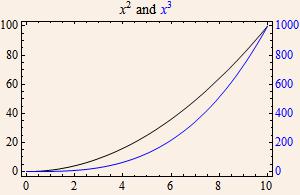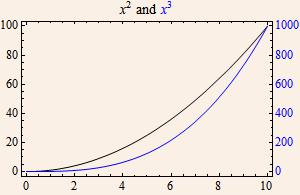There are several solution paths for making third party packages available to people who don't have them. If the package is free, say from a WRI archive, why can't they just download and install it? The only problem here is that most packages are written in a messy form and the user has to jump through a few hoops to use them - the main problem being just to load it. They should be able to just unzip it into their $UserBaseDirectory/Applications folder and then use it. I discuss how to set up packages in this manner in the following reply:
http://community.wolfram.com/groups/-/m/t/393033?ppauth=WS2vzf9p
It's just the standard WRI paradigm and works great.
The Presentations application has a CustomTicks (and also free standing scales). You can draw graphics and then transmit them to other people with Mathematica or Export them in various formats. The recipient does not need to have Presentations. (You can't do that with everything in Presentations.) Here is an example.
<< Presentations`
f1[x_] := x^2;
f2[x_] := x^3;
testPlot1 =
Draw2D[
{Draw[f1[x], {x, 0, 10}, PlotPoints -> 7],
Blue, Draw[f2[x]/10, {x, 0, 10}, PlotPoints -> 7]},
AspectRatio -> 1/GoldenRatio,
Frame -> True,
FrameTicks -> {Automatic, Automatic, Automatic,
CustomTicks[#/10 &, {0, 1000, 200, 4},
CTNumberFunction -> (Style[#, FontColor -> Blue] &)]},
PlotLabel -> Row[{x^2, " and ", Style[x^3, FontColor -> Blue]}],
Background -> Legacy@Linen,
BaseStyle -> {FontSize -> 12},
ImageSize -> 300]

Now we use another Presentations feature to hide extensive code within a notebook.
HiddenNotebookData[myCustomPlot, "Test of plot without package", testPlot1]
This generates the following initialization cell:
myCustomPlot=<<Test of plot without package>>;
It is this last statement that you include in the notebook. It contains the hidden plot data between the skeletons, but the above statement does not because I just copied the plain text form of the statement. Then quitting Mathematica and restarting without Presentations:
myCustomPlot

The actual code in the cell is:
myCustomPlot = Graphics[{{{{}, {}, {
Line[CompressedData["
1:eJwVy3k4FAgfwHH3MfFi0CAyYyzJMYRo0v5+WTcvSzuOHimklSuTaZX1bpuo
6DGtSpu7yMiVnMmkrGNicr5mpyahLBuiJdZ9vPv+8X0+f30pIWd8wiTExMSi
/un/3tlPC3Ze4n4draU+sh1z7RDtTYNOACcLLPasrbvfcIAB9T0WFE4plCh5
Mb6wT0LH8aapNLta+J5TKl5FjofCuvd0ac5TCOm3T+pgJ0NLsiTvhWwLcId7
PS4r/QJmVXc+J9q1gRX/bGg6+VfIFRmR6Ewe3DNVlL6UUAAEqWZYLu6CLck+
jSr2A7hg9m143dtuKKm4ybopVQasCmZno2w/hHVOup1Tegzlh7mBpMIBsHjj
+HwophbGhFLz5+wGoSnlxO1E8hPQjPJMEQgFsN1v2+Onz4Vvxe9qWjKFIN7U
Gx6d8AKeGxvbzxWLILdGc7yI3Q5LLSyhJw7BU1VxJxnrl2Dq+zyi8u07qP3G
WZQixQfPloeu9bLvgSK34hqj1A/TaT23xgXvIdq3dFhUNwApjC/DqoUf4CsF
AkEQMwjPpg+ePWv3B4xXikxY5NfgX3/i2X35cZjJcqFqaYhg4WKKzIBwHE7M
nqrx1B+Cvep92TTmn5DFr84OTRiFuxDSNlM8Bbq0Ftd89jhYEa4qasdNw3v7
+pLydxPQJyj3c8dP4EuQ8BGz/ggyEX9/Kn07A5F1hdcvSk0D3c0hrVZ2Du7S
f+6KUJqDa1W+NPeYOfC9JSplj86BUO20YEwwB/MdQebCunlgjqbvJhbOQ0Pj
DK0/ZgEesl7XxNotQIZg5+oZ8jIsiab85IoWwGyjl1CtuQIOsLFRIL8IJZs1
reoaqzAqT3HuEy6CEXtL301/HXYWRAyZMpcgcaKoNihhG1K6NiU/Fa/Co4Zb
iTlsKext+NxPVV+DZttHe8PtpVHjwWheYPIaJH2u3DywKo0VP/1m0xuyDoZ/
BxJnz8iiwDIlslp3E0ZjLiz9comARK8rU1wPMZQlCAUfs5XxSceWl3+yGFZN
KhxZVlDBQLv4hkWuGJoHN4Sm/qyCHKPwy6bG4tiqG2xnHUVEupSbToG8BGoP
qr8qZ6hhyFNF7ySeJFYRN46pMTVQ1vzKk91bkrjEDpT897oGVnC2dLjWUkgq
ph2Uu6qJS7f+ml54IIUf801DZIq0MC1mIDnssjS+6LyWTpnVxhpqZqMLyiJn
bbhiapyMEmxtslITAeffEE7e9DHAYpdkrY1ZAtJHKRlFpQboIjmjNkXZgTu+
Krc/Jm6I7PNc+bbUHehyRs2SX2OIu0KPLvwQoIAmW4dd03SM0Mr2Lm9kRRHv
SMu7FxFN0HI+df/rHGVMPEb1yT1kgcm9zbU99cpoLPovrTLOAoXl8+btfcp4
n8X1IpZZYMKpAONqSRUUEWx9RaR92DK0h3w9UgUT6kb+c3R5H3rwXsrDQSKm
b3ywMeJZYViO9DDnrSpuHG/xXSm0RULslVWtRVXMcrnq7DFmi48dZHfeUFTD
8IxMq3nKAdyYlfOKRzXM+OaapFnhAbyNCr85c9RQbS+PFcehY/sEsXiSqY5D
20UPTJ/bob45OXqvPAltPi7k0jIR+VL3U/P1SBgX1BMw9RQxVkThEO1I2JHC
v/1qBPFZEnV0LYaEj8dpKfJGh/G73w28XwlImP8HxyvyxWG8nGBqHXVPA0UT
jtd5C/Y41k7frLTRwsF157yhBEe8erA21O2IFgpOZFZYPHREkxpj/p8xWqgX
XR/85HdH/KFA+1ddjhaW/Bjd7G3hhISELfMMtV3oF9tMb512wn201pOs+V3o
0vjO4+YpF7yU5dpNL9fBc60afZ8vuaOyTUVP6A0ybh9vK+6meuPqYOYhgzwy
vizdXj2C3jgWe7FysoyMFSfzVr4EemNtmU96NI+MPaabi/F3vNF396pH/CYZ
4xU9p/MIPpgr7dSdFknBIAnrlwHLPmgoGOVXO+thfCvJLWPsO1RmdtFZDD1c
oiVNK0owcEWxtmx/qB5m/MvTupDCQL7zlTTuT3pI1SXwVYIZGMU1ceuo18PS
dNU5hQ8MrCm80PWGSkWPe5FmcRO+mAOhB3IsqMjRnWVFyPhh8juP0mNARV3l
/rALhn7I2ElOHTtKxe8dmpxGTvvhSirPZSaDikFrutLtf/nhB4PHjY8K/vkl
KvPPq/gjvy1rD7OSioqJOWMOlv6Ysxklt9RJRfPW3NP68f6YnO17vlFIxTl2
VYVNlj9G2eBkwjgVX3VTs0O4/sgQGPkf+kJF3o+rFsXD/vg1U7Vze5uKIznm
rO1tf/wfG78YLA==
"]]}}},
RGBColor[0, 0, 1], {{{}, {}, {
Line[CompressedData["
1:eJwVknk8FAgfh53NOJvclHNy5b7bafj9SBkllFytyhHZEiY06FA5dmljS4cj
ZhHlWtaRY0oiihyRjDMSratyJbe394/v5/n7eT5fRc+AI95cHBwcqT/3f94z
1vGwWmSZbfO3qksQU6Tq9DyRdc1Jhkcr5gvyJ6rNOsTV9BRzcqFBfeNy0PFJ
s4aT1RNx1FII9EyafWy2BTLLhim8OVUguW9xr+xxGaiN4m58TqgFrnW5Z4M1
6qBddO/rJWo90DrV6KFmxvCgV12SQm+EoIYoV1quOfDzPIMf2U1w9N1u1Tm3
AxCmbe9b1tcCP2i+q49eHoHgAvrrSsJbMOJ4Ivy0xhXyzVlukpkdEPqKn6qg
5AEj3TyzIdR34B4uoOdu5gPSfrbRXd1dkCKVffGTlR/YcyZJG9C7YfltQo9J
Lh1+v/ex8JZAD0jd8DAYqwyBGg0Ni5nsXrhZPZU04BYOi7XB3bbYD5YnO99x
MCNAy6nmTGHfANx46uac8vI6nJoibAqEfIClSKXwQpEYsK19bF1OGIaB6D9N
8mtiYTKuNXG0axh21U0vRLXehGjHuUHRzI/g/aBZQELpFigoSKrtDRiBgYWz
XE2JifB0cs/589RPEHyGe9tRs3vgUu7+NINvFJTXf5nU2ZkM8xHRWzq6R2G0
oBLfWz2A+AN59hwPx6AoTO3V03wm7BJvT9Ghf4ZaPekkndwMaByaHz1h9h+o
lcN9GWYWeORJ6cQLjAPRyq26vzIbksCzfjp7AnTuNXV0uOWBIf/vQjuCJiHQ
oT40YqIA2rvynQ/iFMjI8+YupBfBljPfp3L7poEd6Bqd+LIEMg1ljHsffQHa
tBdD270MTDfNrhJDvsJnf9ZwtsgToBywjCslzEBx7MqbzJoq+KPISeeg/wy8
zzB+dKqKBd1iv3WNdM2A6gvfgoutz4A+dFNOJHMWUvgL5klKL6DG8u/6XOIc
LI0ashYd6kAwr8TXPGAOJiyE6PWJ9fA4mF0SSJ2HS3ycnLZmjbDYO+FMzJqH
HSWNhLzcV2AJa2tMvgU4eELXSX1nEwzxKVq1dy8AzdyS3GbVApoBBtM+pt9B
vDKp7dZsK4R37bu1kfUdzpeMyZTnt4ME80y/Fn0RPvV8YGjkdsApnstXG9iL
cOJiWGcVsxNKfktQPm72Ax4wKbskmO/A1rAs4E+BJfAq7FvvrnwP0U3r3FPZ
y8CV/ot/i1sftD35+pYsvgLhtxPSkqv6QerhUJpb1AoclUzPMlEahIIrL0za
PFch88v2IbbAMCyeLeEhdK4Cw27xIKNzGNA1qwPM10DoitOEF/MjdBlEn/1X
fh1EGjvCY20+gZzihd2T8evQnHGtY0FzFHyFT/OSN9aB3TYsKyI2BmvjNOad
gQ2IyOh2e7X4GUTsYiZYNhwo3lTHHiRNQUXDhp1LFAeGtG/FFPVpcKMyniyw
OPCQ7km1TusvkKPuG6mlwYlcMdpm0hnfgMJzQJbJx4UskuvsiNMcDIXXRe4x
58KuQynsBK55iJqlTLJDubCWumXvyZJ5aPugUUEa50LbuTmBJLnv4FkldPh6
IzceFtST6ty1BATdmAq5DW6cVu3tnV9agoKcDVmWEQ9Oh70fe/BmGRYTv03O
P+TBY5EnoeLKKsT5d0R5R/Iiz6XmvHOym6AzZj3FyeJFt9bbu+8SObDr17rD
6XO8qEeJyJr46SVnXSrH9tiCgUJDL4SiObGEfLeShgS0tKgPm8/iRucUIfkx
BgEZ3jNB+vo8uEaKib5WRMBzavQe6Xoe3L9x4Ui1HBFbvlZsW53mxb4el2mN
dSIeUvZKr/AgIlf8DoWt1fzICAsZT+0SwmxalMzaF3404Q2MaYkURhr3tNiE
ogDyJrL7s422Ynwoi68+VgCt1O/cL7Un4XavY/MXXAWx16Wcu69lGxruTmr8
sCSEp6syLy8TxZE9t1n7RlMYVWwZ6gIMcQwvPM2qdBfG80yGUcpncaxVMim+
/VoY7zZKFVGaJfCQUHfy/qStqGWXN9OSJYUGs7HG7FQSLsQFTQVn7sCotmel
reUknFMJ2vOXuix258/qvmwnoSBLdOZwiSyG+7hq/Mu9DV1kHF93vpbD2n41
hRtnt2H91yMbxGgFtGl8xQd7RLD912DXkW9KmJ61GmPkKILZsQY/qOZk/HZV
h0czQAT3dVy2jkgk4+099zekskTQ3dFCs5ayE3uKfebn+EWR0EBvc7qjjN6p
vIM5faLYMZL+cDFYDfkDY5ZlFkRR0jc1N+KdGhZbEiQShMRwOvObyKq+Oq59
IdoxUAzDT9P/a11Qxzso+MIqRwwHA5J/443SwJdjItnjdHFsTQ1xb+7QxjPV
iS/cboij3Vh8Kj/qIClB7MPbh+LolkaLty/SQbfdEpJVbHEsqK8wCaPp/uwk
HRtrKoF2e5WXnXX1cKeuwrldfJKo/ljS8i9pA2zmyYhNV5JEImPpnoqrAQb2
KuaIUCUxr/dQgHWyAT69Th5a8ZdET/pzGZPthnj0vcrhN12SyPgzbV+9shFG
hmsZ+f0thYZXLfRVnExw5CVlvdBEBkW6JZn2alT8fU+p1wEHGWQLrrEeXqOi
ZolG82d/GXTULtws66fiBeaO+/I5Mqiv30kSum2K/OEburfEtuMpi/xvxQRA
fZ26U8Gz23H2/YBytYA5Xku2bqHky+KM/84A1dOWqEKq02c3yuIlj0IJh78t
sTmGkhw0IosGLYKqE72WKBas4VMgLYfX+dcFnWz34WNbIQ65P+RQWMu70pS6
H99ydxhwesvjVdlTn1I0aUgyKWj1SlBAWes0Cnja4PK7u6YqaQq4wjxMo+Ta
4EhgROF4ngIO2363zp+xwdK8IzfPNSrgoP6bopmrh9BJbtmGsa6AqjELZaKP
bPEB7/6WuLOK+OVCwVZitD2qdg01/2ulhP8UZyq9knBAEr2JEuyohFpjpBtc
Fg64JFSaZ+ylhEvPQokR5xyw2SomjnVFCSNT7/JSGxzQj6V5oKH850+fZ7u/
YRzFksywph4yGZdCtJzPTDhiKnj9kqpHRq8jlxdapZwwasAm9ziQEdutykJo
TugooRA7coyMjhMFJ24/dsKl2Eba9C0ymrm4PuH1c8aPKsWV/zDJyJiVf56Q
5ozN9clq9EIyGuUq0k+2O2Pquh9x8TUZLUqN77w1cMGoFKfQym4yyiiv+Jz3
cUE/ExwPHyXjxQWXnGPJLujYpe5iOkdGbT2NyNgWFzSji77e3CTj/CRNe3PT
Bf8HSKJtAA==
"]]}}}}, AspectRatio -> GoldenRatio^(-1), Frame -> True,
FrameTicks -> {Automatic, Automatic, Automatic, {{0,
Style[0, FontColor -> RGBColor[0, 0, 1]], {0.0125, 0}, {
GrayLevel[0.],
AbsoluteThickness[0.25]}}, {20,
Style[200, FontColor -> RGBColor[0, 0, 1]], {0.0125, 0}, {
GrayLevel[0.],
AbsoluteThickness[0.25]}}, {40,
Style[400, FontColor -> RGBColor[0, 0, 1]], {0.0125, 0}, {
GrayLevel[0.],
AbsoluteThickness[0.25]}}, {60,
Style[600, FontColor -> RGBColor[0, 0, 1]], {0.0125, 0}, {
GrayLevel[0.],
AbsoluteThickness[0.25]}}, {80,
Style[800, FontColor -> RGBColor[0, 0, 1]], {0.0125, 0}, {
GrayLevel[0.],
AbsoluteThickness[0.25]}}, {100,
Style[1000, FontColor -> RGBColor[0, 0, 1]], {0.0125, 0}, {
GrayLevel[0.],
AbsoluteThickness[0.25]}}, {5, "", {0.0075, 0}, {
GrayLevel[0.],
AbsoluteThickness[0.125]}}, {10, "", {0.0075, 0}, {
GrayLevel[0.],
AbsoluteThickness[0.125]}}, {15, "", {0.0075, 0}, {
GrayLevel[0.],
AbsoluteThickness[0.125]}}, {25, "", {0.0075, 0}, {
GrayLevel[0.],
AbsoluteThickness[0.125]}}, {30, "", {0.0075, 0}, {
GrayLevel[0.],
AbsoluteThickness[0.125]}}, {35, "", {0.0075, 0}, {
GrayLevel[0.],
AbsoluteThickness[0.125]}}, {45, "", {0.0075, 0}, {
GrayLevel[0.],
AbsoluteThickness[0.125]}}, {50, "", {0.0075, 0}, {
GrayLevel[0.],
AbsoluteThickness[0.125]}}, {55, "", {0.0075, 0}, {
GrayLevel[0.],
AbsoluteThickness[0.125]}}, {65, "", {0.0075, 0}, {
GrayLevel[0.],
AbsoluteThickness[0.125]}}, {70, "", {0.0075, 0}, {
GrayLevel[0.],
AbsoluteThickness[0.125]}}, {75, "", {0.0075, 0}, {
GrayLevel[0.],
AbsoluteThickness[0.125]}}, {85, "", {0.0075, 0}, {
GrayLevel[0.],
AbsoluteThickness[0.125]}}, {90, "", {0.0075, 0}, {
GrayLevel[0.],
AbsoluteThickness[0.125]}}, {95, "", {0.0075, 0}, {
GrayLevel[0.],
AbsoluteThickness[0.125]}}}}, PlotLabel -> Row[{x^2, " and ",
Style[x^3, FontColor -> RGBColor[0, 0, 1]]}],
Background -> RGBColor[0.980407, 0.941206, 0.902005],
BaseStyle -> {FontSize -> 12}, ImageSize -> 300,
PlotRange -> Automatic, PlotRangeClipping -> True];
It is also possible to provide free versions of packages that can be used to evaluate notebooks but are not very useful for writing notebooks. I provide such free versions of Presentations and ExtendUnits at my web site. They are condensed and do not contain any documentation or useful usage messages.
There is also an Applications folder in the free CDF player where readers could place such packages.
Again, I envision that the best form of applications would be like advanced textbooks but with much greater power and flexibility. They might make a great platform for joint research. Or for courseware. If they were priced in line with current textbooks or advanced technical books it would not be out of line for people who wanted to participate to buy and install them.